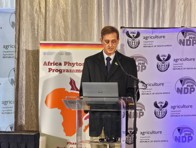
MPUMALANGAHE (South Africa), June 25 (NNN-SANEWS) — South Africa’s Department of Agriculture, in collaboration with the United Nations Food and Agriculture Organisation (FAO) and the International Plant Protection Convention (IPPC), has unveiled the second phase of the Africa Phytosanitary Programme (APP).
APP is an initiative of the IPPC and FAO, which aims to strengthen the resilience of Africa’s phytosanitary systems against plant pests of regulatory, economic, and environmental significance, using cutting-edge digital tools.
Held in White River, Mpumalanga on Monday, the launch brought together over 50 phytosanitary specialists from nine countries, including Algeria, Cape Verde, Chad, the Republic of Congo, Liberia, Malawi, Senegal, South Africa, and Tunisia.
The countries will take part in a weeklong Train-the-Trainer (ToT) workshop in advanced pest surveillance techniques, including the use of customised digital tools and applications for monitoring, detecting, and reporting major pests of economic, regulatory, and environmental importance in Africa.
The participants will be equipped with state-of-the-art tablets for geospatial pest surveillance, use field survey protocols developed by technical experts, and undertake practical sessions using the pest survey tools.
Delivering remarks on behalf of Agriculture Minister John Steenhuisen, Jan Hendrik Venter, Director of Plant Health at the Department of Agriculture, emphasised Africa’s potential to become a global leader in high-quality plant product trade.
“Africa stands at a turning point. With immense biodiversity, rising agricultural productivity, and growing opportunities under the African Continental Free Trade Area (AfCFTA), we are well-positioned to become a global leader in the trade of high-quality plant products.
“But this vision can only be achieved if we ensure that the movement of plants and plant products is safe, traceable, and fully compliant with international phytosanitary standards,” Venter said.
Venter added that well-trained, well-equipped plant health officials across the continent, are the best line of defence in maintaining pest-free or low-prevalence status, “an essential condition for accessing these lucrative markets.”
The first and pilot phase of APP started in 2023, engaging phytosanitary specialists from Cameroon, Democratic Republic of Congo, Egypt, Guinea-Bissau, Kenya, Mali, Morocco, Sierra Leone, Uganda, Zambia, and Zimbabwe.
Phase 2 builds on achievements made in the pilot phase and aims to train plant health officers, who upon their return to their countries will teach their peers in the national plant protection organisations (NPPOs) and other government stakeholders on the use of the APP suite of digital tools.
“We are building a critical mass of phytosanitary inspectors, technicians and officers across Africa, by equipping plant health officers with the tools and skills to prevent and address major plant pest threats, that ultimately jeopardise food security, agricultural trade, economic growth and the environment,” FAO Deputy Director General and IPPC Officer-in-Charge, Beth Bechdol said in her video message.
Funded through generous contributions from the European Union and the United Kingdom of Great Britain and Northern Ireland, APP phase two builds on support from the United States Department of Agriculture (USDA), Animal and Plant Health Inspection Service (APHIS) which funded phase one in 2023.
FAO and the IPPC are working to replicate and scale up the benefits from APP to more African countries and other regions.
Globally, plant pests are responsible for destroying about 40 percent of crop yields, resulting in economic losses of approximately USD 220 billion.
In Africa, the impacts of climate change are exacerbating the problem, with invasive pests such as, fruit flies, false codling moth, maize lethal necrosis disease, citrus greening and fall armyworm – causing major damages.
According to the Centre for Agriculture and Bioscience International (CABI) data, fall armyworm alone is estimated to cause the highest yield loss in Africa – USD 9.4 billion annually.
The African Union’s Plant Health Strategy for Africa highlights that limited technical capability remains a key barrier to achieving sustainable agriculture on the continent.
Through APP, FAO, the IPPC and partners aim to strengthen plant health systems and build national phytosanitary capacity across Africa. — NNN-SANEWS





